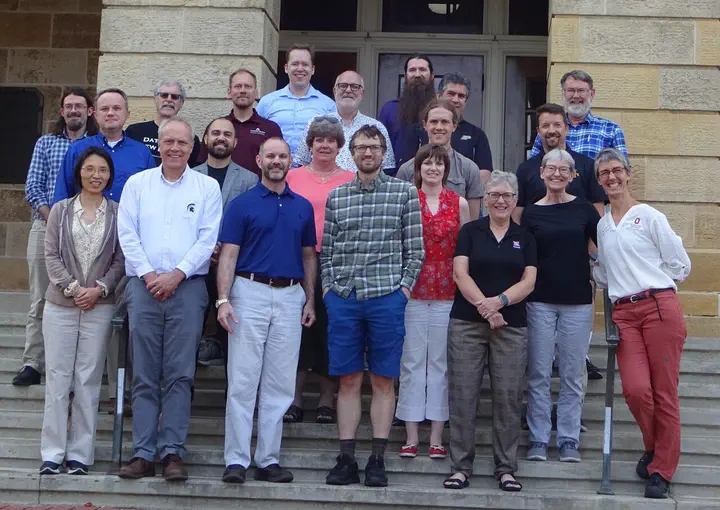2023 NCCC170 Annual Meeting
University of Wisconsin - Madison

Thursday, June 15, 2023
9:00 AM
Introduction and Welcome
From Biometry to Statistics Collaboration at UW-Madison
Brian Yandell, Director, Biometry Program, University of Wisconsin-Madison
9:15 AM
Estimating Genetic Gain — Why the Right Type of BLUP Matters
Philip Dixon, Iowa State University
Plant breeding is one of many reasons for the huge increase in corn yields from 1920 to now. However, there are many confounding factors, including changes in weather, increased fertilization, better weed control, and growing corn at a higher density (# plants / acre).
More...
9:50 AM
Improving Genomic Prediction with Synthetic Traits
Samuel Fernandes, University of Arkansas
Genomic prediction has been one of the essential tools for modern breeding programs, especially for traits that are expensive, labor-intensive, or low-throughput to phenotype. However, phenotypic information is still needed to train prediction models, and the quality of these predictions is bounded by the quality of the phenotypic data set (i.
More...
10:25 AM
Break
10:40 AM
Gaussian Processes with Functional Inputs with Applications to the Water Erosion Prediction Project Computer Model
Jarad Niemi, Iowa State University
The USDA’s Water Erosion Prediction Project (WEPP) computer model utilizes weather, watershed topography, soil type, and land use to estimate water runoff, soil movement, and soil loss. We are constructing Gaussian Process (GP) emulators of this computer model to enable calibration, optimal design, and as a surrogate for WEPP itself.
More...
11:15 AM
Discussion: Online Teaching Panel
Carla Goad, Oklahoma State University
Nick Keuler, University of Wisconsin, Madison
We will lead a panel discussion on the challenges and advantages of teaching online. Topics may include course formats (fully or partially online, synchronous or asynchronous), pros and cons of the technologies available, effectively communicating with students, managing the course, adjusting assessments (e.
More...
12:15 PM
Lunch
1:30 PM
Applied Statistics with ChatGPT: Boons and Banes
John Stevens, Utah State University
When ChatGPT was first launched in November 2022, it opened an era of widely-accessible AI chatbots that have the potential to drastically change how interdisciplinary statisticians train students, collaborate with researchers in various fields, and approach their own statistical research questions.
More...
2:05 PM
Bayesian Risk-based Surveillance Models for Pathogen Detection in Aquaculture
Clark Kogan, Washington State University
In this discussion, we will focus on a Bayesian model for the assessment of pathogen risk in aquaculture. This model combines information about site-specific historical disease testing, test characteristic and information on biosecurity measures to estimate current probability of disease absence.
More...
2:40 PM
Break
2:55 PM
A Look Into Two Statistical Consulting Projects
Steven Moen, University of Wisconsin, Madison
In this talk, I’ll discuss how I used statistics to assist two scientists studying Soil Science and Geography, respectively. For the client in Soil Science, I will explain how we selected a suitable class of models for studying drivers of soil thickness in the continental United States.
More...
3:30 PM
Discussion: Why do we teach ANOVA for factorials?
Dan Runcie, University of California, Davis
In experimentation, the power of manipulating two (or more) factors simultaneously has been recognized for at least a century and the analysis of such experiments is considered among the most basic analyses in biostatistics.
More...
4:30 PM
Conclusion
Friday, June 16, 2023
8:45 AM
Discussion: Reproducibility in the Agricultural Sciences
Julia Piaskowski, University of Idaho
An open discussion on research reproducibility. The National Academy of Sciences defines research reproducibility as “obtaining consistent results using the same data and code as the original study.” The American Society for Cell Biology defines this further: ‘analytical replication’ is obtaining the same results of the original data through reanalysis; ‘direct replication’ is reproducing results by using same experimental design and conditions; and ‘systemic replication’ is reproducing findings using different experimental conditions (e.
More...
9:35 AM
Break
9:45 AM
Business Meeting
Announcements:
Welcome and introduction of Chris Hamilton, NCRA Assistant Director & NIMSS System Admin Preparation of 2022-2023 annual report: Review recent changes in report format Request information on papers, presentations, awards, etc.
More...
11:00 AM
Break / Walk to Greenhouse (0.4 mi)
11:15 AM
Tour of the D.C. Smith Greenhouse
12:15 PM
Lunch